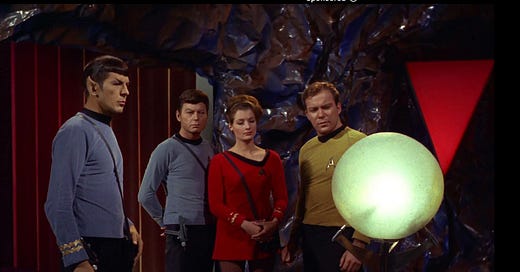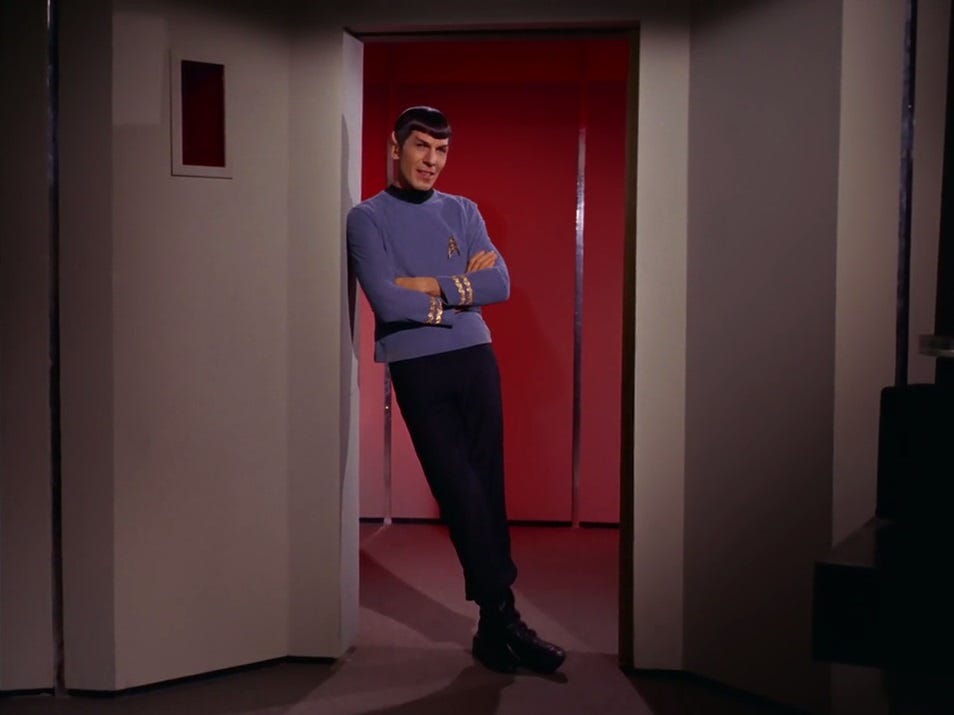Running through all of Star Trek is an implied hierarchy to evolution. Real evolution does not proceed along a straight path from amoeba to intelligent energy being. There are fits and starts, and based on sheer numbers intelligence appears lowly correlated with reproductive success. There are more bacteria than anything else after all. But in Star Trek, history is a continuum in scientific, cultural, and technological ways; evolution is not so much a matter of fitting an environment as it is an accumulation of generational stat points. Planets are divided into “classes” along a developmental spectrum, there are technological “stages” all cultures will pass through, and it appears that the end result for all intelligent beings is an ascension into a bodiless, immortal energy state. “Arena,” “The Gamesters of Triskelion,” “Wolf in the Fold,” “Metamorphosis,” and “Catspaw” all deal with beings that have nominally transcended mere physical existence for something greater, the destined '“next step.” “Return to Tomorrow” is not the first episode to examine the flaws of such beings, but it may be the first to question the assumption that such a state is ultimately desirable.
With a familiar-to-Trek premise, “Return to Tomorrow” could have been another forgettable episode, but expressive direction - courtesy of the show’s best fill-in man Ralph Senensky - great performances, and a (rare) successful plot twist elevate it into the show’s better half. Rather than set up a new alien threat for Kirk and crew to take down, this makes the smart and refreshing choice to present them, initially, with a problem to solve. The Enterprise - in refreshingly deep, bold color via Senensky’s camera - serves as the stage by which the benefits of being embodied are teased out by way of gods that just need some help.
The episode begins in media res with the ship called to a remote, uncharted area of the galaxy by an unexplained signal. Once around the unnamed source planet of the siren call, and after being told by a disembodied voice called “Sargon” that no harm is meant, Kirk, Spock, McCoy, and astrobiologist Ann Mulhall beam down to find a now-familiar sight: a bunch of metaphorical brains in metaphorical jars. Sargon explains that his people had long ago colonized and explored the galaxy before evolving past the need for physical bodies. However, a vague conflict - something said to be far worse than “the early nuclear age” humanity survived - ended their civilization, leaving only himself, his wife Thalassa, and Henoch, a member of the other side of the conflict, as the only survivors. They in turn locked themselves far under the dead surface of their apocalypse-marred planet, hoping to one day be discovered and to spread their knowledge and warnings of collapse among others.
Diana Muldaur as Dr. Ann Mulhall. Muldaur became something of a Star Trek regular, appearing in a later episode of The Original Series before returning in a regular role as Dr. Katherine Pulaski on Season 2 of The Next Generation. After leaving that show, she went on to a recurring role in L.A. Law and picked up two Emmy nominations for her work there.
What is most surprising is not this set-up, but that Sargon is not lying. He explains that the three surviving beings require the bodies of Kirk, Mulhall, and Spock to build themselves mechanical bodies they can inhabit. McCoy voices concerns about this - the “possession” process wreaks havoc on human bodies that can only be controlled with a drug Henoch formulates - but Kirk trusts Sargon after trying the swap out, and makes a wonderfully directed, slow-zoomed speech in favor of aid. None of them, however, think to question Henoch.
The big twist is that Henoch, after feeling Spock’s body, calmly and assuredly determines that mechanical bodies simply will not do. For thousands of years he has been locked inside a jar, a consciousness without any feeling, and while movement will be afforded to him with his new body, sensation will not be. Thalassa and Henoch share the following exchange while “renting out” Mulhall and Spock:
THALASSA: Thank you. Have you prepared the negaton hydracoils for the drawing Sargon supplied?
HENOCH: For all the good it'll do you. It's a fancy name, but how will something that looks like a drop of jelly make this thing work? You'll need microgears and a pulley that does what a muscle does.
THALASSA: That would be highly inefficient.
SCOTT: I tell you, lady, this thing won't work.
HENOCH: It will have twice the strength and agility of your body, engineer, and will last a thousand years. That is, assuming you'll stop wasting your time and allow us to complete it.
(Scott leaves as 'Spock' laughs.)
HENOCH: A thousand-year prison, Thalassa. And when it wears out we'll build another one, and we'll lock ourselves into it for another thousand years. And another, and another. Sargon has closed his mind to a better way. With these bodies.
THALASSA: They're not ours, Henoch.
HENOCH: When you awoke in this body, Thalassa, you said how good it was to breathe again, to have eyes and to see again. To feel. To live and feel again, Thalassa. Just think how much we can do for mankind. Are these bodies too much to ask for in return? Would you prefer this [gesturing at mechanical body]?
THALASSA: No. I'm beginning to hate it.
To effectuate the plan, Henoch hypnotizes Nurse Chapel into providing Kirk with a fake version of the required possession-drug, seeking to kill Sargon and the Captain in one swoop. During his time as the scheming Henoch, Leonard Nimoy is fantastic. Calm, good-humored, with a vague and threatening smile, he seems to be having the time of his life. Nimoy has played evil on the show before - putting in subtle work as an evil Spock in “Mirror, Mirror” - but has never been allowed to go so different. Henoch is not like Spock at all besides being well-mannered and Nimoy makes the most of the freedom.
Henoch’s plan is also simple, believable, and thematically illuminating. It is only revealed well into the episode - far past the point where it settles into its optimistic, problem solving mood - but is clarifying rather than jarring. Yes, Sargon and the others have achieved immortality and “ascended” further up the chain, but that evolution has caused sacrifices. Chiefly, the Star Trek chain of improvement posits that the end result for life is to be disembodied, a concept genuinely unheard of in the real world. All life is, on some level, corporeal and sensational. “Reacts to stimuli” is baked into most common definitions of the term. Energy beings are “physical” - these are not strictly ghosts - but we cannot comprehend a consciousness unfiltered, or perhaps even created, by the body’s senses. Is Henoch’s plan not, in some sense, seeking to return from a kind of death?
Leonard Nimoy as Henoch-in-Spock, his typical rigidity abandoned in favor of a smooth-talking, easy bemusement. He puts in some of his best work on the show here, calling to mind his similarly charismatic and slimy work in Philip Kaufman’s fantastic Invasion of the Body Snatchers (1976).
At the very least, it is understandable, and takes the vague murmured motivation of the evil gods of “Catspaw” and develops it into a full plot. Henoch is foiled once Sargon, living up to the god comparisons and deific name, fakes his death and manages to bluff Henoch out of Spock’s body. The old being then declares that he and his wife will “depart into oblivion,” their knowledge too dangerous and corruptive to survive. “The temptations with a living body are too great,” he states. Kirk and Mulhall permit the ancient lovers use of their bodies for a final kiss. A civilization finally dies; credits roll.
The ending is bittersweet and subtly fatalistic. Sargon’s final act is annihilative; he is the last remaining record of his species’ knowledge. But with his final line, he suggests that such knowledge and advancement is not fit for bodies, with their chemical and sensational whims. Perhaps then, there is knowledge that is simply not fit for life at all. If Star Trek’s civilizational march towards enlightenment ends with the brain in a jar, is it worth marching on? If even those beings that make it covet our embodied existence, is it worth giving up? “Return to Tomorrow” declines to follow the suggestion of its title. The present, or perhaps just the right amount of future, will do just fine.
Stray Thoughts
Joseph Pevney, one of the show’s most prolific directors along with Marc Daniels, was slated for this script, but quit the show following his work on “The Immunity Syndrome,” leading to Ralph Senensky’s filling in. Allegedly, Pevney found the set to be too run by actor ego after producer Gene L. Coon departed in the middle of Season 2.
Ralph Senensky’s credits on the show so far include “This Side of Paradise,” “Metamorphosis,” “Obsession,” and the present. While “Obsession” is certainly the worst of these, that’s a strong resume. All feature compelling visual work.






